SWEDISH
SOUTH ASIAN STUDIES NETWORK
Newsletter 83:
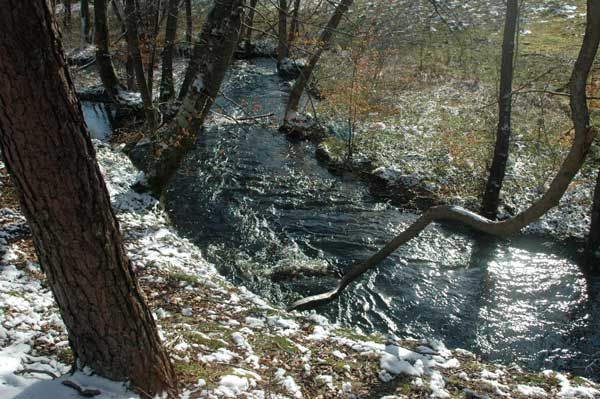 27 March 2008
27 March 2008
| Educational News |
| Politics and Business |
| South Asia related Culture |
| New and updated information |
• Time to apply for SASNET grants
 Applications are now invited for the 2008 round of SASNET grants. Closing date for applications is
15 June 2008. There are three kinds of grants offered by SASNET:
Applications are now invited for the 2008 round of SASNET grants. Closing date for applications is
15 June 2008. There are three kinds of grants offered by SASNET:
– 1. Networking grants for planning new research and/or
education programmes or projects in collaboration between Swedish and South Asian partners;
– 2. Guest lecture programme grants (for inviting a guest lecturer
from South Asia to visit Swedish
universities), and
– 3. Grants for organising South Asia related interdisciplinary research
workshops either in Sweden or in South Asia.
Please note that the main applicant must always be
a researcher or teacher based at a Swedish university. All previously distributed SASNET grants are presented on our web page (go for the complete list).
Decisions will be taken in late August 2008. More information.
• SASNET board decided to establish sub-network for
students
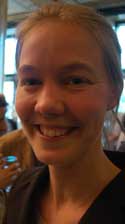 The SASNET board met
in Lund on Tuesday 5 February 2008. Decisions were taken that SASNET should establish a sub-network for
students interested in South Asia related studies. PhD candidate Malin Gregersen (photo), Dept. of History, Lund University, will be engaged to create a to web based students forum on SASNET’s web site.
The SASNET board met
in Lund on Tuesday 5 February 2008. Decisions were taken that SASNET should establish a sub-network for
students interested in South Asia related studies. PhD candidate Malin Gregersen (photo), Dept. of History, Lund University, will be engaged to create a to web based students forum on SASNET’s web site.
During 2008, SASNET will concentrate on developing the South Asian Studies network in Sweden, through visits to different universities, such as Göteborg, Karlstad, Kalmar, Linköping, and
Malmö. The main event during the year will however be the organisation of the SASNET funded conference on “Nature, Knowledge, Power” in August 2008, in collaboration
with Uppsala University, see below.
Moreover, in January 2009, plans are under way for a conference on health and social care of marginalized
groups, to be held in Colombo, Sri Lanka, with invited scholars from both Sweden and South Asia. This conference would be the first outcome of the discussions that were held at the SASNET South Asian Reference Group meeting in November 2007, to form SASNET sub-networks for specific issues. Read the verified Minutes.
• Time to register for Uppsala research conference on Nature, Knowledge, Power
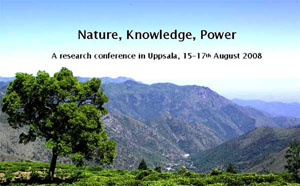 A research conference titled ”Nature, Knowledge, Power”, aiming at bringing together researchers from different academic fields, concerned with questions of environment and society under present and historical conditions, will be held in Uppsala 15–17 August 2008. The conference is
co-organised by SASNET, the Dept. for Rural and Urban Development at the Swedish University for Agricultural Sciences (SLU), and Uppsala Centre for Sustainable Development (CSD). The themes for the sessions are: – Energy: renewable and sustainable?; Competing rights, codifying law; – Community rights under neoliberal rule; – Who needs conservation? Nature, people, survival ; – Contested urban environments; and – Ideologies of environmental change: from imperial modernization to postcolonial social equality? Deadline for applications to the conference is 31 March 2008. More information.
A research conference titled ”Nature, Knowledge, Power”, aiming at bringing together researchers from different academic fields, concerned with questions of environment and society under present and historical conditions, will be held in Uppsala 15–17 August 2008. The conference is
co-organised by SASNET, the Dept. for Rural and Urban Development at the Swedish University for Agricultural Sciences (SLU), and Uppsala Centre for Sustainable Development (CSD). The themes for the sessions are: – Energy: renewable and sustainable?; Competing rights, codifying law; – Community rights under neoliberal rule; – Who needs conservation? Nature, people, survival ; – Contested urban environments; and – Ideologies of environmental change: from imperial modernization to postcolonial social equality? Deadline for applications to the conference is 31 March 2008. More information.
• Stockholm meeting discussing new country strategy for development cooperation with India
 On March 13, 2008, SASNET’s Director Anna Lindberg participated in a meeting at the Department for Asia and the Pacific region, Swedish Ministry of Foreign Affairs (UD) in Stockholm. The aim of the meeting was to discuss the new country strategy for development cooperation with India that has been announced by the Swedish Government. The task of implementing the new strategy has been given to the Swedish International Development Cooperation Agency, Sida. “Traditional development cooperation” has been phased out and replaced by selective and actor-based development cooperation. The point of departure in the new strategy is that the financing of various projects will gradually shift to the partners involved (more information about the Swedish policy for Global Development).
Klas Molin (head of the Department for Asia and the Pacific Region) led the meeting, which was attended by approximately one hundred people. Most of them represented Swedish universities, the business world, SIDA, UD, or various organisations. The organisers expressed their satisfaction and surprise that so many individuals came to the meeting – an indicator of the importance India is playing in the global arena today. The participants had the opportunity to contribute their input on the new development strategy. SIDA is now working on the details of the projected strategy and will deliver a final proposal to the Swedish Government in October 2008.
On March 13, 2008, SASNET’s Director Anna Lindberg participated in a meeting at the Department for Asia and the Pacific region, Swedish Ministry of Foreign Affairs (UD) in Stockholm. The aim of the meeting was to discuss the new country strategy for development cooperation with India that has been announced by the Swedish Government. The task of implementing the new strategy has been given to the Swedish International Development Cooperation Agency, Sida. “Traditional development cooperation” has been phased out and replaced by selective and actor-based development cooperation. The point of departure in the new strategy is that the financing of various projects will gradually shift to the partners involved (more information about the Swedish policy for Global Development).
Klas Molin (head of the Department for Asia and the Pacific Region) led the meeting, which was attended by approximately one hundred people. Most of them represented Swedish universities, the business world, SIDA, UD, or various organisations. The organisers expressed their satisfaction and surprise that so many individuals came to the meeting – an indicator of the importance India is playing in the global arena today. The participants had the opportunity to contribute their input on the new development strategy. SIDA is now working on the details of the projected strategy and will deliver a final proposal to the Swedish Government in October 2008.
• SASNET/SIBC/Ideon joint business seminar to be held in Lund
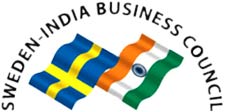 On Thursday 10 April 2008, 12.00–17.00, SASNET and SIBC (Sweden-India Business Council) will organise a business seminar in Lund in collaboration with the Ideon Science Park. The seminar is titled ”Operating in India” (Verksam i Indien), and includes presentations focusing on challenges that Swedish companies face when they establish businesses in India. The issue of Corporate Social
Responsibility (CSR) will be a key concept. SASNET’s Director, Dr. Anna Lindberg, will introduce the seminar. Register your participation before 31 March 2008. Venue: Ideon Science Center,
Knut Wicksells Konferensrum,
Scheelevägen 17, Lund. Read the full programme (as a pdf-file)
On Thursday 10 April 2008, 12.00–17.00, SASNET and SIBC (Sweden-India Business Council) will organise a business seminar in Lund in collaboration with the Ideon Science Park. The seminar is titled ”Operating in India” (Verksam i Indien), and includes presentations focusing on challenges that Swedish companies face when they establish businesses in India. The issue of Corporate Social
Responsibility (CSR) will be a key concept. SASNET’s Director, Dr. Anna Lindberg, will introduce the seminar. Register your participation before 31 March 2008. Venue: Ideon Science Center,
Knut Wicksells Konferensrum,
Scheelevägen 17, Lund. Read the full programme (as a pdf-file)
• Anirudh Krishna lectures about Roots of Development and Democracy in India
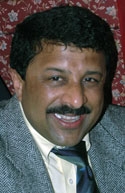 Dr. Anirudh Krishna, Associate Professor of Public Policy and Political Science at the Sanford Institute of Public Policy, Duke University, Durham, N.C., USA holds a SASNET lecture in Lund on Tuesday 1 April 2008, 19.00. The lecture, organised in collaboration with the Association of Foreign Affairs at Lund University (UPF), is titled ”Active Social Capital: Tracing the Roots of Development and Democracy in India”, which is also the title of Dr. Krishna’s recently published book. During the academic year 2007/08, Dr. Krishna is on sabbatical leave from Duke University, instead being Olof Palme Visiting Professor at Uppsala University. Venue: Edens hörsal, Dept. of Political Science, Paradisgatan 5, Lund. More information about Dr. Krishna.
Dr. Anirudh Krishna, Associate Professor of Public Policy and Political Science at the Sanford Institute of Public Policy, Duke University, Durham, N.C., USA holds a SASNET lecture in Lund on Tuesday 1 April 2008, 19.00. The lecture, organised in collaboration with the Association of Foreign Affairs at Lund University (UPF), is titled ”Active Social Capital: Tracing the Roots of Development and Democracy in India”, which is also the title of Dr. Krishna’s recently published book. During the academic year 2007/08, Dr. Krishna is on sabbatical leave from Duke University, instead being Olof Palme Visiting Professor at Uppsala University. Venue: Edens hörsal, Dept. of Political Science, Paradisgatan 5, Lund. More information about Dr. Krishna.
• Visit to Institute for Security and Development Policy in Stockholm
 On Wednesday 12 March 2008, SASNET’s deputy director Lars Eklund visited the Institute for Security and Development Policy (ISDP) in Nacka-Stockholm. A fruitful meeting was organised by ISDP’s deputy director Robert Nilsson, in order for Lars to present SASNET to the Director Niklas Swanström and other ISDP researchers currently working on projects related to South Asia and Afghanistan. ISDP was established as an independent research institute as late as October 2007 but has its roots in the Silk Road Studies Program that was launched at Uppsala University in 2002.
The Institute is dedicated to expanding understanding of international affairs, particularly the interrelationship between the issue areas of conflict, security and development, and has a core funding from the Swedish government/Ministry of Foreign Affairs. It has two constituent parts: the Central Asia-Caucasus Institute & Silk Road Studies Program ((CACI & SRSP) run in collaboration with the Johns Hopkins University’s School of Advanced International Studies in Washington D.C., USA; and the Asia Program – oriented towards the Eastern part of the Eurasian continent including South Asia. More information about ISDP.
On Wednesday 12 March 2008, SASNET’s deputy director Lars Eklund visited the Institute for Security and Development Policy (ISDP) in Nacka-Stockholm. A fruitful meeting was organised by ISDP’s deputy director Robert Nilsson, in order for Lars to present SASNET to the Director Niklas Swanström and other ISDP researchers currently working on projects related to South Asia and Afghanistan. ISDP was established as an independent research institute as late as October 2007 but has its roots in the Silk Road Studies Program that was launched at Uppsala University in 2002.
The Institute is dedicated to expanding understanding of international affairs, particularly the interrelationship between the issue areas of conflict, security and development, and has a core funding from the Swedish government/Ministry of Foreign Affairs. It has two constituent parts: the Central Asia-Caucasus Institute & Silk Road Studies Program ((CACI & SRSP) run in collaboration with the Johns Hopkins University’s School of Advanced International Studies in Washington D.C., USA; and the Asia Program – oriented towards the Eastern part of the Eurasian continent including South Asia. More information about ISDP.
• Asoke Bhattacharya visited SASNET and Lund University
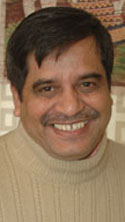 Professor Asoke Bhattacharya from the Adult
and Continuing Education and Extension Centre at Jadavpur University in Kolkata, visited SASNET and Lund University 16–17 March 2008. During the early spring 2008, Prof. Bhattacharya spent three months as a visiting scholar at the Danish University for Pedagogy in Copenhagen. His research focuses on the work by the 19th Century Danish priest, poet and writer N F S Grundtvig, considered to be a pioneer within
the field of adult education, and while in Denmark Prof. Bhattacharya’s new book titled ”Education for
the People” was launched during a function at the Centre for Grundtvig Studies, University of Aarhus.
Besides visiting SASNET (that Prof. Bhattacharya has a long-standing relation with) he also met researchers at Lund University’s Dept. of Education, discussing possible new collaboration projects.
Professor Asoke Bhattacharya from the Adult
and Continuing Education and Extension Centre at Jadavpur University in Kolkata, visited SASNET and Lund University 16–17 March 2008. During the early spring 2008, Prof. Bhattacharya spent three months as a visiting scholar at the Danish University for Pedagogy in Copenhagen. His research focuses on the work by the 19th Century Danish priest, poet and writer N F S Grundtvig, considered to be a pioneer within
the field of adult education, and while in Denmark Prof. Bhattacharya’s new book titled ”Education for
the People” was launched during a function at the Centre for Grundtvig Studies, University of Aarhus.
Besides visiting SASNET (that Prof. Bhattacharya has a long-standing relation with) he also met researchers at Lund University’s Dept. of Education, discussing possible new collaboration projects.
• Aida
Aragão-Lagergren visited SASNET
 Associate Professor Aida
Aragão-Lagergren, Dept. of Social and Economic Geography, Uppsala University, visited the SASNET root node office in Lund on Wednesday 19 March 2008. She informed about the status of her ongoing research project focusing on ”Children left behind.
A study on children of migrant women in Sri Lanka”, carried out in collaboration with Prof. Kumudu
Wijewardena, University of Sri Jayewardenepura (SJP),
Sri Lanka. The project was initially given a SASNET planning grant, and later on awarded major research grants from Sida/SAREC and the Swedish Research Council. More
information, including an abstract to the project (only in Swedish).
Associate Professor Aida
Aragão-Lagergren, Dept. of Social and Economic Geography, Uppsala University, visited the SASNET root node office in Lund on Wednesday 19 March 2008. She informed about the status of her ongoing research project focusing on ”Children left behind.
A study on children of migrant women in Sri Lanka”, carried out in collaboration with Prof. Kumudu
Wijewardena, University of Sri Jayewardenepura (SJP),
Sri Lanka. The project was initially given a SASNET planning grant, and later on awarded major research grants from Sida/SAREC and the Swedish Research Council. More
information, including an abstract to the project (only in Swedish).
• More information about SASNET and its
activities
See SASNET’s page, http://www.sasnet.lu.se/sasnet.html
• Uppsala University announces position as Director for Nordic Centre in India (NCI)
 Uppsala University now announces the position as NCI Director for the period May 2008 – April 2010. The 50 % position, now titled ”Researcher with responsibility for the Nordic Centre in India”, will remain to be based within the Department of Government. Since September 2006 the position has been held by Dr. Mirja Juntunen. (More information about the Nordic Centre in India university consortium).
The researcher to be appointed will be responsible for the daily activities at the NCI, including the follow-up of ongoing programmes as well as to develop new projects according to the directives of the NCI board and general assembly. Applicants should have completed a doctoral degree, and have a minimum of three years of relevant professional experience. The applicant must be familiar with higher education and research in the Nordic countries and India. Good knowledge about India and its society is also required. Deadline for applications is Thursday 10 April 2008. Read the full announcement (as a pdf-file).
Uppsala University now announces the position as NCI Director for the period May 2008 – April 2010. The 50 % position, now titled ”Researcher with responsibility for the Nordic Centre in India”, will remain to be based within the Department of Government. Since September 2006 the position has been held by Dr. Mirja Juntunen. (More information about the Nordic Centre in India university consortium).
The researcher to be appointed will be responsible for the daily activities at the NCI, including the follow-up of ongoing programmes as well as to develop new projects according to the directives of the NCI board and general assembly. Applicants should have completed a doctoral degree, and have a minimum of three years of relevant professional experience. The applicant must be familiar with higher education and research in the Nordic countries and India. Good knowledge about India and its society is also required. Deadline for applications is Thursday 10 April 2008. Read the full announcement (as a pdf-file).
• WorldFish provides useful compendia on funding opportunities for research
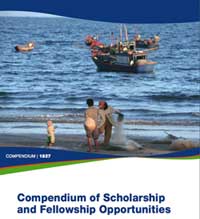 The international, non-profit, non-governmental organization WorldFish has published useful books providing information about funding opportunities for research, training and development projects in Asia, Africa and Latin America. It also provides a separate compendium of scholarship and fellowship opportunities. WorldFish, with headquarters in Penang, Malaysia, works in partnership with a wide range of government and non-governmental agencies in the developing world, and with advanced research institutions worldwide. Besides, it is one of 15 centers supported by the Consultative Group on International Agricultural Research (CGIAR), a group of farsighted and caring investors worldwide including governments, development banks, philanthropic organizations and development institutions. In South Asia, WorldFish has so far mainly concentrated on Bangladesh (more information).
The international, non-profit, non-governmental organization WorldFish has published useful books providing information about funding opportunities for research, training and development projects in Asia, Africa and Latin America. It also provides a separate compendium of scholarship and fellowship opportunities. WorldFish, with headquarters in Penang, Malaysia, works in partnership with a wide range of government and non-governmental agencies in the developing world, and with advanced research institutions worldwide. Besides, it is one of 15 centers supported by the Consultative Group on International Agricultural Research (CGIAR), a group of farsighted and caring investors worldwide including governments, development banks, philanthropic organizations and development institutions. In South Asia, WorldFish has so far mainly concentrated on Bangladesh (more information).
Go for the
Asia Compendium of Funding Opportunities.
Go for the
Compendium of Scholarship and Fellowship Opportunities.
• Time to register for the fourth Sida conference on Swedish development research
![]() For the fourth time, Sida/SAREC – the unit for research cooperation within the the Swedish International Development Cooperation Agency Sida – will finance a conference on current Swedish development research, to be held in Uppsala 27–29 May 2008. Previously Sida has initiated three similar conferences, the first one in Göteborg in 2000, the second in Lund in 2003 (more information), and the third and most recent one, focusing on ”Structures of Vulnerability:
Mobilisation and Resistance”, was held in Stockholm in 2005 (more information). The 2008 conference is organised by the Centre for Sustainable Development in Uppsala, an inter-disciplinary centre for education and research on sustainable development, jointly run by Uppsala University and the Swedish University of Agricultural Sciences (SLU) in Uppsala.
For the fourth time, Sida/SAREC – the unit for research cooperation within the the Swedish International Development Cooperation Agency Sida – will finance a conference on current Swedish development research, to be held in Uppsala 27–29 May 2008. Previously Sida has initiated three similar conferences, the first one in Göteborg in 2000, the second in Lund in 2003 (more information), and the third and most recent one, focusing on ”Structures of Vulnerability:
Mobilisation and Resistance”, was held in Stockholm in 2005 (more information). The 2008 conference is organised by the Centre for Sustainable Development in Uppsala, an inter-disciplinary centre for education and research on sustainable development, jointly run by Uppsala University and the Swedish University of Agricultural Sciences (SLU) in Uppsala.
The general theme for the conference will be “Meeting Global Challenges in Research Cooperation”. Researchers and development professionals are invited to gather and discuss key themes at the frontiers of research and global development issues. More specifically, the topics for discussion will be sustainable energy systems, maternal and child health, water and sanitation, soil degradation, sustainable agriculture, survival strategies of the poor, conflicts over natural resources, housing and infrastructure, human rights, democracy, global trade and climate change. Invited panels will also discuss research training strategies, future priorities in research questions and cooperation in research financing for global development.
All Sida/Sarec financed scientists and Sida staff have been invited to the Uppsala conference, as well as all others with an interest in the research areas presented. All accepted conference presentations and summaries of discussions will later be published in a book. Abstracts must be delivered before Tuesday 1 April 2008 (Note: extended deadline). Venue for the conference: Atrium Konferens, Dragarbrunnsgatan 46, Uppsala. More information.
• Ramachandra Guha holder of the Arne Næss Chair for 2008 at SUM in Oslo
 The chair holder of the Arne Næss Chair for 2008 at the Centre for Development and Environment (SUM), University of Oslo is the renowned Indian social historian and biographer Ramachandra Guha. He is an international scholar who has held several academic positions in India, Europe, and North America, and who counts visiting professorships at the universities of California at Berkeley, Yale, Stanford, and Oslo among his merits. His latest book is ”India After Gandhi: The History of the World’s Largest Democracy”, which was released in April 2007. Based on research in more than fifty archival collections, this book is the first substantial history of independent India, and covers culture and the arts as well as economics and politics. More information.
The chair holder of the Arne Næss Chair for 2008 at the Centre for Development and Environment (SUM), University of Oslo is the renowned Indian social historian and biographer Ramachandra Guha. He is an international scholar who has held several academic positions in India, Europe, and North America, and who counts visiting professorships at the universities of California at Berkeley, Yale, Stanford, and Oslo among his merits. His latest book is ”India After Gandhi: The History of the World’s Largest Democracy”, which was released in April 2007. Based on research in more than fifty archival collections, this book is the first substantial history of independent India, and covers culture and the arts as well as economics and politics. More information.
• Appeals for collaboration between Swedish and South Asian scholars
Now and then, SASNET publishes specific appeals from South Asian
researchers interested to proceed with projects in collaboration
with partners in Sweden, and vice versa.
– Professor A.P. Das, Department of Botany, University of North Bengal, Siliguri, West Bengal, India, is looking for partners at Swedish botany departments for research collaboration. His main interest is within the fields of Plant Taxonomy, and Exploration and Conservation of Biodiversity. Prof. Das has a teaching experience of more than 32 years and has a special fascination for the Swedish botanist Carl von Linné. During the Linnean Tercentenary year 2007, he delivered a number of special lectures in different Indian universities, colleges and other interested organisations. Prof. Das would now appreciate to work with colleagues at Swedish Universities. He also offers the possibility to receive Swedish students to visit his university, in order to study the flora and vegetation of the Eastern Himalayas. Contact Prof. Das for more information.
– Dr. Md. Aktarul Islam Chowdhury, Head of the Civil and Environmental Engineering Department, Shahjalal University of Science and Technology (SUST), Sylhet, Bangladesh, wants to make academic linkages and research collaboration in the field of environmental engineering and environmental management. He is interested in institutions located throughout the world that handle and manage the emerging environmental issues such as climatic change, water crisis, water management, sanitation (specially ecological sanitation), waste water management (specially industrial effluent treatment), wetland management, solid waste management, integrated environmental management, assessment and conservation of biodiversity, socio-economic aspects of environmental management etc. properly and in time (read his CV). It should be mentioned that Dr. Chowdhury’s department was the first academic faculty in the entire South Asia to offer a B.Sc. Engineering degree in Environmental Engineering already in 1996. Contact Dr. Chowdhury for more information.
• UNDP's Regional Centre in Colombo offers Academic Fellowships
 UNDP's (United Nations Development
Programme) Regional Centre in Colombo (RCC) offers Human Development Academic Fellowships for for citizens of the Asia-Pacific countries.
The aim of the fellowships is to analyse issues from the human development perspective, with a focus on fostering creative thinking and innovative research on the subject among young people. The research must focus on a well-defined aspect of human development, could be theoretical, applied, policy-oriented or a combination and must amount to a substantive contribution to human development thinking relevant for the region. The Fellowship is intended for young PhD students who are at an advanced dissertation stage working on a topic related to human development – theoretical, applied or policy oriented. More information about the UNDP Academic Fellowships for Asia and Pacific.
UNDP's (United Nations Development
Programme) Regional Centre in Colombo (RCC) offers Human Development Academic Fellowships for for citizens of the Asia-Pacific countries.
The aim of the fellowships is to analyse issues from the human development perspective, with a focus on fostering creative thinking and innovative research on the subject among young people. The research must focus on a well-defined aspect of human development, could be theoretical, applied, policy-oriented or a combination and must amount to a substantive contribution to human development thinking relevant for the region. The Fellowship is intended for young PhD students who are at an advanced dissertation stage working on a topic related to human development – theoretical, applied or policy oriented. More information about the UNDP Academic Fellowships for Asia and Pacific.
• Humboldt University announces professorship in Modern South Asian History
Humboldt University in Berlin, Germany, announces two positions at the Institut für Asien- und Afrikawissenschaften. The first post is a full professorship in Modern South Asian History and Culture, the second one a junior professorship in South Asian Media. The application deadline is Thursday 3 April 2008. The posts are to be filled by 1 October 2008. More information. Although the advertisement is only published in German, applications by foreign scholars are most welcome.
• University of Groningen announces position as Assistant Professor in Development Studies
The inter-faculty Centre of Development Studies (CDS) of the University of Groningen, the Netherlands, announces a position as Assistant Professor in Development Studies and/or Globalization. The candidate must hold a PhD in Development Studies, Geography, Sociology, Anthropology, Economics, or a related discipline; and he/she should have an excellent command of English and Dutch (or have the capacity to learn Dutch in a reasonable time). Deadline for applications: Monday 14 April 2008.
• More information about South Asia related
research at Swedish and Nordic universities
See SASNET’s page, http://www.sasnet.lu.se/research.html
• Nearly 200 South Asia related MFS theses during the period 2003-07
 Over the years, a large number of Swedish undergraduate students at C and D level have been provided with so-called Minor Field Studies (MFS) grants giving them an opportunity to carry out thesis work in developing countries, including South Asia. The stipend programme
is funded by Sida (the Swedish International Development Cooperation
Agency), but administered by the International Programme Office for Education
and Training (Internationella Programkontoret) – recently moved to Visby. More
information about the MFS grants.
Over the years, a large number of Swedish undergraduate students at C and D level have been provided with so-called Minor Field Studies (MFS) grants giving them an opportunity to carry out thesis work in developing countries, including South Asia. The stipend programme
is funded by Sida (the Swedish International Development Cooperation
Agency), but administered by the International Programme Office for Education
and Training (Internationella Programkontoret) – recently moved to Visby. More
information about the MFS grants.
Students given MFS grants should undergo a preparatory two-day course. Such courses are organised by the International Programme Office 25 times a year at three locations: Uppsala University, Göteborg University and Umeå University. More information about the courses.
A searchable database where all MFS theses since 2003 are presented in full-text is available. Go to the database.
See also specific lists of South Asia related MFS projects during the period 2003-07:
– Afghanistan (1 project)
– Bangladesh (17 projects)
– India (120 projects)
– Nepal (7 projects)
– Pakistan (3 projects)
– Sri Lanka (29 projects)
No projects have been carried out in Bhutan and the Maldives during this period.
• Leiden Summer School in Languages and Linguistics offers Indology Programme
 The Leiden Summer School in Languages and Linguistics at the Faculty of Arts, Leiden University, the Netherlands offers an Indological Programme during the period 28 July – 8 August 2008. It includes a 2 ECTS-credits introductory course on ”The language and poetics of the Rigveda: selected
hymns”, taught by
Dr. Werner Knobl, University of Kyoto, Japan; another 2 ECTS-credits introductory course on ”Early Sanskrit prose literature: selections from
Brahmanas and Upanisads”, also taught by Dr. Knobl; and a 2 ECTS-credits course on ”The Ashoka inscriptions as a source for the study of the ancient history of
India”, taught by
Dr. Herman Tieken, Leiden University.
The Leiden Summer School in Languages and Linguistics at the Faculty of Arts, Leiden University, the Netherlands offers an Indological Programme during the period 28 July – 8 August 2008. It includes a 2 ECTS-credits introductory course on ”The language and poetics of the Rigveda: selected
hymns”, taught by
Dr. Werner Knobl, University of Kyoto, Japan; another 2 ECTS-credits introductory course on ”Early Sanskrit prose literature: selections from
Brahmanas and Upanisads”, also taught by Dr. Knobl; and a 2 ECTS-credits course on ”The Ashoka inscriptions as a source for the study of the ancient history of
India”, taught by
Dr. Herman Tieken, Leiden University.
The Leiden Summer School in Languages and Linguistics also offers an Indo-European Programme. Within this programme, some courses of interest to Indologists will be given: Iranian languages (Avestan, Old Persian, Parthian/Middle Persian, Sogdian) as well as an introduction to Vedic Sanskrit.
• Tamil Summer School 2008 in Pondicherry
The Puducherry
(Pondicherry) Institute of Linguistics and Culture (PILC) organises an intensive six-weeks Tamil Summer School 2008.
It is organised from 14 July
– 23 August 2008. The Tamil Summer School was initiated
in 1998 by the Department of Social Sciences, French Institute,
Puducherry to offer training to language researchers in Humanities
and Social sciences. PILC has been organising this course since
2004. The medium
of teaching is English as well as Tamil. The TSS focuses on
Spoken Tamil rather than on the classical and written forms
being taught in European Universities. The level of spoken Tamil
course is INTERMEDIATE. More
information (as a pdf-file).
• Museion in Göteborg offers several South Asia related courses
Museion, a Göteborg University
program cooperating with several university departments and
the Museum of World Culture (Världskulturmuseet),
offers a Masters programme in International Museum Studies,
and several South Asia related undergraduate courses focusing
on Globalization; Power and Marginalization; and Knowledge
and Communication. Some of them are South Asia related. More
information about Museion’s South Asia related educational programmes.
Under the theme ”Knowledge and Communication”, the following South Asia related course is run during the Fall 2008. Last date for applications: Friday 18 April 2008.
– A 15 credits course on China and India: Visualisations of Nations (Kina och Indien: visualiseringar av nationer). Contact person: Dr. Eva Rosén Hockersmith.
Under the theme ”Power and Marginalization”, the following South Asia related course is run during the Fall 2008. Last date for applications: Friday 18 April 2008.
– A 15 credits course on The Challenges of Buddhism: Power, Morality and Resistance in a Global Perspective (Buddhismens utmaningar: makt, moral och motstånd i ett globalt perspektiv). Contact person: Dr. Per Lundberg, School of Global Studies, Göteborg University. More information about the course.
Under the theme ”Globalisation”, the following South Asia related courses are run during the Fall 2008. Last date for applications: Friday 18 April 2008.
– A 15 credits course on Religion and Politics: Meetings in the Global Room (Religion och Politik: Möten i det globala rummet). Contact person: Jan Johansson from the Dept of Social Anthropology, School of Global Studies, Göteborg University. More information about the course.
– A 15 credits course on The Global City (Den globala staden). Contact person: Dr. Marie Thynell from the Dept. of Peace and Development Studies (PADRIGU), School of Global Studies, Göteborg University. More information about the course.
– A 15 credits course on Global Gender Studies (Globala Genusstudier). Contact person: Dr. Gunilla Blomqvist from the Dept. of Peace and Development Studies (PADRIGU), School of Global Studies, Göteborg University. More information about the course.During the Spring 2009, Museion also offers another South Asia related course under the theme ”Power and Marginalisation”. Last date for applications: 15 October 2008.
– A 15 credits course on Power, Resistance and Change 1 (Makt, motstånd och förändring I). Contact person: Dr. Stellan Vinthagen, from the Dept. of Peace and Development Studies (PADRIGU), School of Global Studies, Göteborg University. More information about the course.
• Stockholm University now runs the course on Changing
India and Ourselves
The Dept. of Educational Science with an emphasis on Humanities and Social Science (UHS), a new department created after the merger of the Stockholm Institute of Education with Stockholm University on January 1, 2008, organises a 10 credits (15 ECTS) course titled ”Changing
India and Ourselves” during
the Spring 2008 (January–March). The course has been developed out
of a course titled ”Changing South” that Dr. Jim Walch
has run successfully at the Stockholm Institute of Education since 1993. The course consists of two parts, first five weeks
field studies in Tamil Nadu, India, where the students should
confront, analyse and reflect upon the various patterns of poverty
and domination that can be found in the South and in the relation
to the richer parts of the world; and then five weeks literature
studies and seminars in Sweden. Contact persons for the course are Margareta Adolphson and Bodil Nilsson. More
information on the 2008 course.
• Association of Bangladeshi Students celebrates Bengali New Year
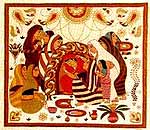 The
Association of Bangladeshi Students (ABS), based at
Chalmers University of Technology and Göteborg University.
Established in 2003 to strengthen Sweden-Bangladesh educational
and cultural network and to explore scholarship/funding
opportunities for Bangladeshi students. A celebration of the Bengali New Year 1415 will
held in Göteborg on Sunday 4 May 2008. For the fourth year in a row
it is organised by ABS. It will include a cultural programme with songs and
dance performances. The Honorable Ambassador of Bangladesh
in Scandinavia will hold a speech,
and a traditional Bangladeshi dinner be served. Venue: Chalmers University of Technology,
Göteborg. More
information.
The
Association of Bangladeshi Students (ABS), based at
Chalmers University of Technology and Göteborg University.
Established in 2003 to strengthen Sweden-Bangladesh educational
and cultural network and to explore scholarship/funding
opportunities for Bangladeshi students. A celebration of the Bengali New Year 1415 will
held in Göteborg on Sunday 4 May 2008. For the fourth year in a row
it is organised by ABS. It will include a cultural programme with songs and
dance performances. The Honorable Ambassador of Bangladesh
in Scandinavia will hold a speech,
and a traditional Bangladeshi dinner be served. Venue: Chalmers University of Technology,
Göteborg. More
information.
• More information about South Asia related
education at Swedish and Nordic universities
See SASNET’s page, http://www.sasnet.lu.se/education.html
• Second South Asian Studies Alliance conference in Claremont
 The South Asian Studies Alliance (SASA), a coalition of like minded individuals interested in the advancement of South Asian studies in the United States, organises its second South Asia Conference in Claremont, California, 29–30 March 2008. It is co-hosted by the School of Religion and the School of Politics and Economics, Claremont Graduate University in Claremont near to Los Angeles. The theme for the conference is ”East and West Entwined”, seeking to explore the myriad ways in which South Asia and the values associated with the East have interacted with those of the West. As always, however, submissions on any topic within South Asian Studies are most welcome. More information about the SASA conference.
The South Asian Studies Alliance (SASA), a coalition of like minded individuals interested in the advancement of South Asian studies in the United States, organises its second South Asia Conference in Claremont, California, 29–30 March 2008. It is co-hosted by the School of Religion and the School of Politics and Economics, Claremont Graduate University in Claremont near to Los Angeles. The theme for the conference is ”East and West Entwined”, seeking to explore the myriad ways in which South Asia and the values associated with the East have interacted with those of the West. As always, however, submissions on any topic within South Asian Studies are most welcome. More information about the SASA conference.
• 58th Annual Conference of the British Political Studies Association in Swansea
The 58th Annual Conference of the British Political Studies Association is hosted by the Department of Politics and International Relations at the Swansea University, UK, 1–3 April 2008. The conference is the largest UK gathering of researchers in politics and international relations. In a Specialist Group Guest Speaker Competition, Professor Amita Shastri from San Francisco participates. She is hosted by the Development Politics specialist group (convenor: Ben Thirkell-White and Andrew Wyatt), the Ethnopolitics group (convenor: Stefan Wolff) and the Politics of South Asia Group (convenor: Lawrence Saez). Professor Shastri will give a paper on 'Political parties and the development of democracy in Sri Lanka' and will contribute to panels on contemporary politics in South Asia, prospects for the resolution of conflict in Sri Lanka, and the politics of ethnicity and development.
• Oslo conference on peace and reconciliation in South Asia
A International conference on ”Peace and Reconciliation in South Asia – Challenges and Opportunities” will be held in Oslo, Norway 10–11 April 2008. The Conference will bring together leading political representatives from South Asia, as well as Western experts, with an aim to facilitate dialogue and explore novel approaches to bring lasting peace to South Asia. It is organised as an initiative by the International Association for Human Values (led by Sri Sri Ravi Shankar), in collaboration with other organisations. Venue: Ingeniørenes Hus Møtesenter, Kronprinsens gate 17, Oslo. More information.
• Fifth South Asia Graduate Student Conference in Chicago
 The fifth annual South Asia Graduate Student Conference at the University of Chicago will be held 11–12 April 2008. The aim of this conference is to encourage discussion regarding the current state and future trajectories of South Asian studies, particularly in the wake of interventions made by the Subaltern Studies group. To this end, the diverse range of concepts and themes that are being investigated by current South Asianist graduate students in both the Humanities and the Social Sciences suggest some broader questions: South Asianist graduate students working on any period, on any theme, and any Humanities or Social sciences discipline, are invited to consider how their work contributes to a conversation on new perspectives in South Asian research. More information.
The fifth annual South Asia Graduate Student Conference at the University of Chicago will be held 11–12 April 2008. The aim of this conference is to encourage discussion regarding the current state and future trajectories of South Asian studies, particularly in the wake of interventions made by the Subaltern Studies group. To this end, the diverse range of concepts and themes that are being investigated by current South Asianist graduate students in both the Humanities and the Social Sciences suggest some broader questions: South Asianist graduate students working on any period, on any theme, and any Humanities or Social sciences discipline, are invited to consider how their work contributes to a conversation on new perspectives in South Asian research. More information.
• PhD Course on Business and Global Governance for Sustainable Development in Oslo
 A PhD Course on ”Business and Global Governance for Sustainable Development” will be held in Oslo, 14–16 April 2008. The course is organised by the Centre for Development and Environment (SUM) at the University of Oslo. This intensive three-day course has the primary objectives to provide students with an intensive but thorough introduction
to the different theoretical perspectives on the role and influence of
business on global governance; to provide students with a critical review of how business
influences the policies of particular international institutions and
agreements; and • to allow students to present their own research and
receive feedback from other students and lecturers. Among the lecturers are Dr. Robert Falkner, Lecturer in International Relations at the London
School of Economics (LSE); Dr. Peter Newell, Professor of Development Studies at the University of
East Anglia; and Christopher Wright, LSE/Alcoa Fellow 2007-09 and a Visiting Researcher
at SUM. Participants will be accommodated in Oslo. The cost of room and board for
three days will be fully covered by SUM. More information.
A PhD Course on ”Business and Global Governance for Sustainable Development” will be held in Oslo, 14–16 April 2008. The course is organised by the Centre for Development and Environment (SUM) at the University of Oslo. This intensive three-day course has the primary objectives to provide students with an intensive but thorough introduction
to the different theoretical perspectives on the role and influence of
business on global governance; to provide students with a critical review of how business
influences the policies of particular international institutions and
agreements; and • to allow students to present their own research and
receive feedback from other students and lecturers. Among the lecturers are Dr. Robert Falkner, Lecturer in International Relations at the London
School of Economics (LSE); Dr. Peter Newell, Professor of Development Studies at the University of
East Anglia; and Christopher Wright, LSE/Alcoa Fellow 2007-09 and a Visiting Researcher
at SUM. Participants will be accommodated in Oslo. The cost of room and board for
three days will be fully covered by SUM. More information.
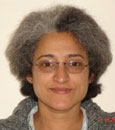 • PhD course on Gender, Rural Development and Natural Resource Management in Uppsala
• PhD course on Gender, Rural Development and Natural Resource Management in Uppsala
A multidisciplinary PhD course on ”Gender, Rural Development and Natural Resource Management” will be held in Uppsala 28 April – 16 May 2008. The 4,5 ECTS credits course is provided by the Unit for Rural Development, Department for Urban and
Rural Studies, Swedish University of Agricultural Sciences (SLU). It will focus on the role that gender equality and
democracy have in the attainment of sustainable development. What pressures do violent conflicts and
epidemics put on resource use and how does that impact on gender
relations? What insights do we gain from feminist postcolonial readings of
development and natural resource management? The teachers include the SLU researchers Seema Arora-Jonsson and Adam Pain. Dr. Nitya Rao (photo to the right) from the University of East Anglia, UK, will also take part in the course, and teach about ”Land and gender: Key debates”. Applications (in English) should be mailed to course coordinator Seema
Arora-Jonsson and copied to Elinor
Carlbrand. Deadline for applications is Monday 14 April 2008. More information.
• 40 panels to choose from at the
20th ECMSAS conference in Manchester
 The
20th European Conference on Modern South Asian Studies (ECMSAS)
will be held in Manchester, UK, 8–11 July 2008.
The ECMSAS is the largest gathering of South Asia oriented researchers
in Europe, covering all fields from the humanities and social sciences
to technology, natural sciences and medicine. The conference is
held biannually under the aegis of the European Association of
South Asian Studies (EASAS), a professional, non-profit organisation
of scholars engaged in research and teaching concerning South Asia
with regard to all periods and fields of study.
The 2008 conference
will be hosted by the School of Arts, Histories and Cultures at
the University of Manchester, and draws on the vibrant South Asian
Studies programmes in Humanities and Social Sciences at the University. Venue: Humanities Lime Grove building, University of Manchester Oxford Road Campus. Deadline for early-bird registration is 21 April 2008. Go to the conference
web site.
The
20th European Conference on Modern South Asian Studies (ECMSAS)
will be held in Manchester, UK, 8–11 July 2008.
The ECMSAS is the largest gathering of South Asia oriented researchers
in Europe, covering all fields from the humanities and social sciences
to technology, natural sciences and medicine. The conference is
held biannually under the aegis of the European Association of
South Asian Studies (EASAS), a professional, non-profit organisation
of scholars engaged in research and teaching concerning South Asia
with regard to all periods and fields of study.
The 2008 conference
will be hosted by the School of Arts, Histories and Cultures at
the University of Manchester, and draws on the vibrant South Asian
Studies programmes in Humanities and Social Sciences at the University. Venue: Humanities Lime Grove building, University of Manchester Oxford Road Campus. Deadline for early-bird registration is 21 April 2008. Go to the conference
web site.
40 panels have been accepted, covering a vast field of scientific areas, from ”Censorship, Subjectivity, and Subversion: Cultural Regulation in India from the
Colonial Era to the Present” to ”Vegetarianisms: the communicative power of meat in South Asia” and ”Routes and Roots of Democracy in the Himalayas”. Full information about the accepted panels.
SASNET organised
the 18th ECMSAS conference in Lund in 2004 (more
information about the Lund conference), and in June 2006, the
19th ECMSAS conference was arranged in Leiden, the Netherlands
(read SASNET’s report
from the Leiden conference).
• Research-training workshop on Rural Property and Inequality in Norwich
A research-training workshop on Rural Property and Inequality will be held in Norwich, UK, 1–2 September 2008. The workshop, jointly organised by the School of Development Studies, University of East
Anglia, UK, and International Development Studies at Roskilde University, Denmark, is open to all PhD students. Maximum number of participants is 15. The aim of the course is to discuss ways to actually study and analyze relationships between rural property and inequality. The basis for this is each participant’s research, being they invited speakers or PhD researchers. Last date for applications: 31 March 2008.
• Gangtok conference on Buddhist Himalaya: Studies in Religion, History and Culture
An international conference on ”Buddhist Himalaya: Studies in Religion, History and Culture” will be held in Gangtok, Sikkim, India, 1–5 October 2008. The conference is organised by the Namgyal Institute of Tibetology in Gangtok, as part of its Golden Jubilee in 2008. This is India’s leading centre for the study of Tibetan and Himalayan Buddhist culture. The conference will be convened by Dr. Alex McKay from the International Institute for Asian Studies (IIAS), Leiden, the Netherlands, and being together around 60 leading scholars in the field, mostly from India and the Himalayan states, but also a number of distinguished researchers from Europe, Japan and America. Participation will be by invitation only, and there will no call for papers, although observers are welcome to attend under their own auspices.
• XXXVI World Congress on Housing Science to be held in Kolkata
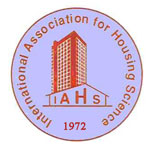 The XXXVI World Congress on Housing Science will be held in Kolkata, India, 3–7 November 2008. It is being organised by the Indian Institute of Technology (IIT) Kharagpur on behalf of the International Association for Housing Science (IAHS). The Congress will cover the various national housing programmes that have evolved the world over. It will address the issues of urban development and urban environmentalism. The effects of globalisation on housing, innovative housing finance schemes will feature among discussions. An emphasis will be given on new building materials like nano and low energy materials, and construction management concepts like simulation based optimisation process and best fit approach. Classical issues of slum and squatter settlement up gradation and provision of urban infrastructure will also be covered. The Congress will give us a better understanding and global perspective on housing science and may go a long way to improve the overall housing situation. This will be the second IAHS Congress to be held in India. Venue: at Hotel ITC Sonar Bangla, Kolkata.
The XXXVI World Congress on Housing Science will be held in Kolkata, India, 3–7 November 2008. It is being organised by the Indian Institute of Technology (IIT) Kharagpur on behalf of the International Association for Housing Science (IAHS). The Congress will cover the various national housing programmes that have evolved the world over. It will address the issues of urban development and urban environmentalism. The effects of globalisation on housing, innovative housing finance schemes will feature among discussions. An emphasis will be given on new building materials like nano and low energy materials, and construction management concepts like simulation based optimisation process and best fit approach. Classical issues of slum and squatter settlement up gradation and provision of urban infrastructure will also be covered. The Congress will give us a better understanding and global perspective on housing science and may go a long way to improve the overall housing situation. This will be the second IAHS Congress to be held in India. Venue: at Hotel ITC Sonar Bangla, Kolkata.
• Other conferences connected to South Asian
studies arranged all over the World
See SASNET’s page, http://www.sasnet.lu.se/conferences.html#conf
Important lectures and seminars in Scandinavia
• Oslo seminar on the Relevance of Mahabharata In The Modern
World
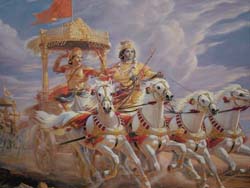 A seminar on ”The Relevance of Mahabharata In The Modern
World” will be held in Oslo on Saturday 29 March 2008, 10.00–14.00. Researchers within the fields of History of Religion and Comparative Literature will shed light on the importance of Mahabharata for people living today. The seminar is held in connection with the performances of ”The Game of Dice” by the Indian dance academy Sandhya in Oslo on Saturday 29th and Monday 31st March 2008 (more information). Venue: Public foyer, National Theatre, Johanne Dybwads plass 1, Oslo. The seminar includes an Indian lunch, and an entrance fee, 200 Norwegian kronor (100 for students), will be charged.
A seminar on ”The Relevance of Mahabharata In The Modern
World” will be held in Oslo on Saturday 29 March 2008, 10.00–14.00. Researchers within the fields of History of Religion and Comparative Literature will shed light on the importance of Mahabharata for people living today. The seminar is held in connection with the performances of ”The Game of Dice” by the Indian dance academy Sandhya in Oslo on Saturday 29th and Monday 31st March 2008 (more information). Venue: Public foyer, National Theatre, Johanne Dybwads plass 1, Oslo. The seminar includes an Indian lunch, and an entrance fee, 200 Norwegian kronor (100 for students), will be charged.
• Stockholm seminar on human rights in the world
A seminar titled ”Mänskliga rättigheter i världens länder – Hur långt har vi kommit och vart är vi på väg?” (Human rights in the nations of the world – how far have we come, and where are we heading?) will be held in Stockholm on Monday 31 March 2008, 18.30–20.00. The seminar is organised by the Swedish Development Forum (FUF), and the invited speakers include Jan Nordlander, Swedish ambassador for human rights, and
Sara Gustafsson, coordinator for the Swedish development assistance programme for Afghanistan. Venue: Rosenbads konferenscenter, Drottninggatan 1, Stockholm. Participants should register to fuf@fuf.se before Friday 28 March. More information.
• Uppsala lecture on Language Activism among the Kurmi Community
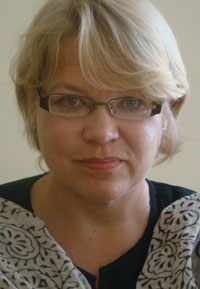 Dr. Mirja Juntunen will lecture in Uppsala on ”Language Activism among the Kurmi Community in Jharkhand, West-Bengal and Orissa”, on Tuesday 1 April 2008, 10.15–12.00. During the recent years the Kurmi community in West-Bengal, Jharkhand and Orissa has intensified their activities for (re)constructing a tribal identity in order to strengthen their economic, political, social and legal status in the society. The main instrument, and argument, in this attempt is the Kurmali language, which according to the Kurmis, is a Dravidian language. However, Kurmali seems to be one of those Indo-Aryan languages which involves Dravidian, Munda and Tibeto-Burman substrata. The ultimate aim of the language activities seems to be that of establishing a status of indigenous people and to be included in the list of ‘scheduled tribes’. The lecture is part of a seminar series organised by the Forum for Advanced Studies in Arts, Languages and Theology (SALT) at Uppsala University in collaboration with the South Asia Seminar at the university. Venue: Room 2-1077, English Park Campus, Uppsala.
Dr. Mirja Juntunen will lecture in Uppsala on ”Language Activism among the Kurmi Community in Jharkhand, West-Bengal and Orissa”, on Tuesday 1 April 2008, 10.15–12.00. During the recent years the Kurmi community in West-Bengal, Jharkhand and Orissa has intensified their activities for (re)constructing a tribal identity in order to strengthen their economic, political, social and legal status in the society. The main instrument, and argument, in this attempt is the Kurmali language, which according to the Kurmis, is a Dravidian language. However, Kurmali seems to be one of those Indo-Aryan languages which involves Dravidian, Munda and Tibeto-Burman substrata. The ultimate aim of the language activities seems to be that of establishing a status of indigenous people and to be included in the list of ‘scheduled tribes’. The lecture is part of a seminar series organised by the Forum for Advanced Studies in Arts, Languages and Theology (SALT) at Uppsala University in collaboration with the South Asia Seminar at the university. Venue: Room 2-1077, English Park Campus, Uppsala.
• Stockholm seminar on India, Sweden and the Arms race
Ms. Binalakshmi Nepram, peace activist from India and founder of the organisation Control Arms Foundation of India, holds two seminars in Stockholm on Friday 4 April 2008. She has been invited to Sweden by the Swedish Peace and Arbitration Society (SPAS). The first seminar is titled "Women, War & Peace" and will be held as a lunch seminar at 08.00. She will talk about ”Armed Violence, Small Arms Proliferation and Women’s Response
in India’s Northeast Region”. A documentary film titled ”The Story of Manipuri Women Gun Survivors” will also be shown.
The second seminar, co-organised by Amnesty International, is titled "India, Sweden and the Arms race" and will be held 16.00–17.15. Ms. Nepram will talk about ”From a Non-Violent to an Armed Nation – the increasing weaponisation of India & the emerging efforts by the Indian society to control arms”. During this seminar, Mr. Rolf Lindahl, SPAS, will also talk about ”Fueling conflict, undermining development – Swedish arms sales to India and Pakistan”. Venue for both seminars: Sensus, Medborgarplatsen 4, Stockholm. Participants should register before 3 April to Rolf Lindahl. Please note, only a limited number of seats are available.
• Public panel debate on Do We Need Development Theory? at Lund University
A public panel debate on the theme ”Do We Need Development Theory?” will be held at Lund University on
Friday 4 April 2008, 16.00–17.30. On the panel we find Rita Abrahamsen (University of Wales), Björn Hettne (Göteborg University), Ray Kiely (Queen Mary, University of London), Ronaldo Munck (Dublin City University), Nita Rudra (University of Pittsburgh) and Christine Sylvester (Lancaster University) who present their views of the matter before the floor is opened up for questions and comments from the audience. Göran Djurfeldt (Dept. of Sociology, Lund University) will guide and moderate the debate.
All are welcome. Venue: Eden’s auditorium, Dept. of Political Science, Paradisgatan 5, Lund.
• Staffan Lindberg lectures about 25 years of change in Tamil Nadu
Professor Staffan Lindberg, Dept. of Sociology, Lund University (and former SASNET Director) will hold a lecture in Copenhagen on Wednesday 9 April 2008, 17.00–19.00. He will talk about ”Caste, Class and Gender. Rural Tamil Nadu in a 25 year perspective”. The lecture is organised by Verdenskulturcentret (Centre of World Culture) and U-landsforeningen Svalerne. More information (as a pdf-file).
• Uppsala seminar on India and China in the 'Asian Century'
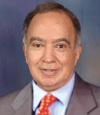 Dr. Krishnan Srinivasan holds a lecture titled ”Crouching Tiger, Hidden Dragon or Lumbering Elephant? India and China in the 'Asian Century'” in Uppsala on Thursday 10 April 2008, 18.15. Venue: Swedish Collegium for Advanced Study (SCAS), Uppsala University, Linneanum, Thunbergsvägen 2. Dr. Srinivasan, who for many years worked as a diplomat for the Indian Foreign Service and also served as Commonwealth Deputy Secretary-General in London until 2002, is also a well-renowned scholar. Since 2006, he is a Fellow of the Maulana Azad Institute of Asian Studies (MAKAIAS) in Kolkata, India, and during 2008 he is a Fellow at SCAS in Uppsala. At SCAS, Srinivasan is working on a monograph on the future limits of multilateralism in the twenty-first century. He proposes to examine whether multilateralism can survive the scepticism that currently surrounds the working and effectiveness of contemporary multilateral instruments, and whether it will be replaced by a trend towards greater unilateralism on the part of the major powers that will emerge by the middle of the present century. More information.
Dr. Krishnan Srinivasan holds a lecture titled ”Crouching Tiger, Hidden Dragon or Lumbering Elephant? India and China in the 'Asian Century'” in Uppsala on Thursday 10 April 2008, 18.15. Venue: Swedish Collegium for Advanced Study (SCAS), Uppsala University, Linneanum, Thunbergsvägen 2. Dr. Srinivasan, who for many years worked as a diplomat for the Indian Foreign Service and also served as Commonwealth Deputy Secretary-General in London until 2002, is also a well-renowned scholar. Since 2006, he is a Fellow of the Maulana Azad Institute of Asian Studies (MAKAIAS) in Kolkata, India, and during 2008 he is a Fellow at SCAS in Uppsala. At SCAS, Srinivasan is working on a monograph on the future limits of multilateralism in the twenty-first century. He proposes to examine whether multilateralism can survive the scepticism that currently surrounds the working and effectiveness of contemporary multilateral instruments, and whether it will be replaced by a trend towards greater unilateralism on the part of the major powers that will emerge by the middle of the present century. More information.
• Copenhagen seminar on Afghan hearts and minds
 An open seminar on ”Afghan Hearts, Afghan Minds. Civil-Military Relations in Southern Afghanistan” will be held in Copenhagen on Monday 14 April 2008, 15.00–16.30. It is organised by the Danish Institute for International Studies (DIIS). Two different perspectives from the contested ground of
Southern Afghanistan will be presented. A military perspective will be
presented by Lars Gruby, the former Commanding Officer of the Danish
CIMIC (Civilian Military Cooperation) Detachment that was deployed in
Helmand from August 2007 to February 2008. The team worked primarily in
the villages of Lashkar Gar and Gereskh, but was deployed in other parts
of Helmand as well, for example in Musa Qala, Sangin and in Upper
Gereskh Valley. He will share his experience and his team's
perception of the civilian population and the possibilities of winning
their support for the current government and the project of
stabilization and reconstruction. From the civilian side, Sippi Azerbaijani-Moghaddam will talk about her
impression of the concerns and perceptions of the civilian population.
She has several years of experience from working in Southern
Afghanistan, and has recently undertaken a study of perceptions of
civil-military relations in the provinces of Paktia and Uruzgan for the
British Agencies Afghanistan Group (BAAG), an NGO-umbrella organization.
Azerbaijani-Moghaddam will talk about how the local population perceive
of the changing conditions of insecurity, the different actors coming
from afar to their area, and the attempts of military and civilian
organizations to facilitate stability and reconstruction. Venue: DIIS, Nordskov Meeting Room, Wilders Plads 8H, 3rd floor, 1401 Copenhagen, Denmark.
An open seminar on ”Afghan Hearts, Afghan Minds. Civil-Military Relations in Southern Afghanistan” will be held in Copenhagen on Monday 14 April 2008, 15.00–16.30. It is organised by the Danish Institute for International Studies (DIIS). Two different perspectives from the contested ground of
Southern Afghanistan will be presented. A military perspective will be
presented by Lars Gruby, the former Commanding Officer of the Danish
CIMIC (Civilian Military Cooperation) Detachment that was deployed in
Helmand from August 2007 to February 2008. The team worked primarily in
the villages of Lashkar Gar and Gereskh, but was deployed in other parts
of Helmand as well, for example in Musa Qala, Sangin and in Upper
Gereskh Valley. He will share his experience and his team's
perception of the civilian population and the possibilities of winning
their support for the current government and the project of
stabilization and reconstruction. From the civilian side, Sippi Azerbaijani-Moghaddam will talk about her
impression of the concerns and perceptions of the civilian population.
She has several years of experience from working in Southern
Afghanistan, and has recently undertaken a study of perceptions of
civil-military relations in the provinces of Paktia and Uruzgan for the
British Agencies Afghanistan Group (BAAG), an NGO-umbrella organization.
Azerbaijani-Moghaddam will talk about how the local population perceive
of the changing conditions of insecurity, the different actors coming
from afar to their area, and the attempts of military and civilian
organizations to facilitate stability and reconstruction. Venue: DIIS, Nordskov Meeting Room, Wilders Plads 8H, 3rd floor, 1401 Copenhagen, Denmark.
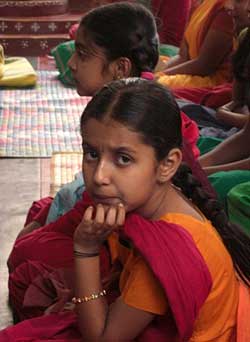 • Göteborg seminar on India – land of the future?
• Göteborg seminar on India – land of the future?
A seminar titled ”Indien – ett framtidsland?” (India – land of the future?) will be held in Göteborg on Friday 18 April 2008, 09.30–13.00. The seminar is organised by the Board of Regional Research in West Sweden (Reväst), a unit connected to Göteborg University. In November 2008, Reväst sent a delegation of people representing universities, business and culture to Bangalore in India. The experiences from this tour will now be presented, but the seminar will also include other presentations. Dr. Roger Schweizer from the Dept. of Business Administration, Göteborg University, will talk about the merger between Sandoz India Limited and Hindustan Ciba-Geigy Limited in the 1990s. Dr.
Marc Katz from the Dept. of of Religious Studies and Theology, Karlstad University, will present his university’s long-standing Indian study programme in Varanasi.
Lars Eklund, deputy director for SASNET, will also participate in the seminar to present SASNET’s activities and especially its web site. All are welcome, but participants should register to Reväst/Gun Nordström. Venue: CG-salen, School of Business, Economics and Law, Göteborg University, Vasagatan 1. Read the full programme for the seminar (as a pdf-file).
• Oslo lecture on European NGOs working with local partners in Bangladesh
Dr. Meghna Guhathakurta, Executive Director of Research Initiatives, Bangladesh, and former Professor of International Relations at the University of Dhaka from 1984 to 2006, lectures in Oslo on Friday 18 April 2008, 10.00–12.00. The title of her presentation is ”Mobility, Mobilization or Negotiation: NGO Discourses in Poverty Reduction”. The seminar is organised by the Centre for Development and the Environment (SUM) at the University of Oslo, and is part of a seminar series run by SUM during the Spring 2008, with the overall theme ”Poverty and Development in the 21st Century (PAD)”. In her presentation, Dr. Guhathakurta will focus on perspectives on the role of NGOs in development and poverty reduction, and how these have been changing along with the shifting architecture of global aid and development since the last decade or so. She intends to look at some of the ways in which European NGOs working with local partners in Bangladesh respond to the various discourses on poverty at the global, national and local level with a specific focus on some of these strategic issues and discursive practices. All are welcome, but pre-registration is encouraged by sending an e-mail
to Maren Aase. Venue: Seminar room, 4th floor, SUM, University of
Oslo, Sognsveien 68 (near 'Ullevål Stadion'), Oslo. More information.
• Jockin Arputham participates in Stockholm seminar on urban planning
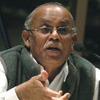 Mr. Jockin Arputham, president of the Indian National Slum Dwellers Federation and the Slum Dwellers International (SDI), will participate in a seminar/panel discussion in Stockholm on Monday 21 April 2008, 13.15–17.00. The seminar, organised by the Royal University College of Fine Arts (KKH) in Stockholm, is titled ”Staden som mänsklig rättighet” (The city as a human right). It focuses on urban planning and means to achieve poverty reduction. Mr. Arputham from Mumbai, winner of the 2000 Ramon Magsaysay Award for Peace and International Understanding, argues that all people have a right to their city and also decent housing, no matter if you are talking about Stockholm, Mumbai, Sao Paulo or Lilongwe. Other participants to the seminar include Thomas Melin, Head of the Division for Urban Development at the Swedish International Development Cooperation Agency (Sida); Inga Björk-Klevby from the United Nations Human Settlements Programme UN-HABITAT; and Prof. Inga-Britt Werner, Dept. of Urban Planning and Environment, Royal Institute of Technology (KTH), Stockholm. The seminar is part of an ongoing project entitled ”Informal Cities”, that has been initiated by the Royal University College of Fine Arts. An exhibition and a conference on this theme are planned to be organised later this year (5–8 september 2008) in collaboration with Slum Dwellers International at Dieselverkstan in Nacka. Venue for the April 21 seminar: Studio Tre, Kulturhuset, Sergels Torg, Stockholm. For more information, please contact Anna Erlandson, KKH.
Mr. Jockin Arputham, president of the Indian National Slum Dwellers Federation and the Slum Dwellers International (SDI), will participate in a seminar/panel discussion in Stockholm on Monday 21 April 2008, 13.15–17.00. The seminar, organised by the Royal University College of Fine Arts (KKH) in Stockholm, is titled ”Staden som mänsklig rättighet” (The city as a human right). It focuses on urban planning and means to achieve poverty reduction. Mr. Arputham from Mumbai, winner of the 2000 Ramon Magsaysay Award for Peace and International Understanding, argues that all people have a right to their city and also decent housing, no matter if you are talking about Stockholm, Mumbai, Sao Paulo or Lilongwe. Other participants to the seminar include Thomas Melin, Head of the Division for Urban Development at the Swedish International Development Cooperation Agency (Sida); Inga Björk-Klevby from the United Nations Human Settlements Programme UN-HABITAT; and Prof. Inga-Britt Werner, Dept. of Urban Planning and Environment, Royal Institute of Technology (KTH), Stockholm. The seminar is part of an ongoing project entitled ”Informal Cities”, that has been initiated by the Royal University College of Fine Arts. An exhibition and a conference on this theme are planned to be organised later this year (5–8 september 2008) in collaboration with Slum Dwellers International at Dieselverkstan in Nacka. Venue for the April 21 seminar: Studio Tre, Kulturhuset, Sergels Torg, Stockholm. For more information, please contact Anna Erlandson, KKH.
• Seema Purushothaman lectures in Oslo
Seema Purushothaman from the Ashoka Trust for Research in Ecology and the Environment (ATREE), India, will give a seminar in Oslo on Friday 25 April 2008, 10.00–11.30. She will speak about ”Investing in Natural and Social Capital for Poverty Reduction: Insights from Rural India”. The seminar, organised by the The Centre for Development and the Environment (SUM), University of Oslo, is part of the ongoing seminar series on ”Poverty and Development in the 21st Century (PAD)”. Venue: 4th floor seminar room, SUM, Sognsveien 68, Oslo. More information, with an abstract.
Business and Politics
• Information about South Asia related business and politics in Sweden
See SASNET's page, http://www.sasnet.lu.se/polbuss.html
South Asia related culture in Scandinavia
• Two performances of The Game of Dice in Oslo
 The Indian dance academy Sadhya, based in New Delhi, will perform its much acclaimed production ”The Game of Dice” in Oslo, Norway at The National Theatre on 29th & 31st March 2008, with workshops & seminars on Mahabharata. The performances, on Saturday 29 March, 18.00, and Monday 31 March, 12.00, have been realised through a collaboration between the Norwegian National Theatre and the Damini House of Culture in Oslo. Sadhya is a leading Indian dance academy led by the choreographer Santosh Nair that fuses traditional Indian dance forms such as Kathakali and Chhau with contemporary dance. Venue: National Theatre, main stage, Johannes Dybwads plass 1, Oslo. More information.
The Indian dance academy Sadhya, based in New Delhi, will perform its much acclaimed production ”The Game of Dice” in Oslo, Norway at The National Theatre on 29th & 31st March 2008, with workshops & seminars on Mahabharata. The performances, on Saturday 29 March, 18.00, and Monday 31 March, 12.00, have been realised through a collaboration between the Norwegian National Theatre and the Damini House of Culture in Oslo. Sadhya is a leading Indian dance academy led by the choreographer Santosh Nair that fuses traditional Indian dance forms such as Kathakali and Chhau with contemporary dance. Venue: National Theatre, main stage, Johannes Dybwads plass 1, Oslo. More information.
• Bollywood exhibition in Stockholm on display till 27th April
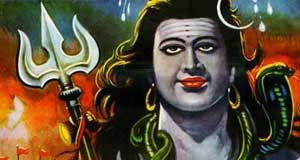 The exhibition "BOLLYWOOD
– Living gods of India" is still shown at the Museum of Far Eastern Antiquities (Östasiatiska
Museet) in Stockholm. The exhibition takes
off in Indian films, and shows how contemporary India is connected
to its past through stories and myths about love, gods and heroes.
The gods belong to the everyday, but they are also worshiped in
great style at various festivities all year round. But India is
not only Hinduism. India is also the world’s third largest Muslim
country (after Indonesia and Pakistan). And many Christians, Jains,
Buddhists and Zoroastrians live here too. In the exhibition, the
museum’s own collections of sculptures and paintings meet
newer, borrowed and purchased material, for example from Helsinki
City Art Museum, including popular prints, painted altar figures
made of straw and clay, picture scrolls from Midnapur, printed
and hand-painted Bollywood posters, contemporary photographs and
a great many Bollywood films.
The exhibition will be on display till Sunday 27 April 2008. Venue: Museum of
Far Eastern Antiquities, Skeppsholmen, Stockholm. More
information
The exhibition "BOLLYWOOD
– Living gods of India" is still shown at the Museum of Far Eastern Antiquities (Östasiatiska
Museet) in Stockholm. The exhibition takes
off in Indian films, and shows how contemporary India is connected
to its past through stories and myths about love, gods and heroes.
The gods belong to the everyday, but they are also worshiped in
great style at various festivities all year round. But India is
not only Hinduism. India is also the world’s third largest Muslim
country (after Indonesia and Pakistan). And many Christians, Jains,
Buddhists and Zoroastrians live here too. In the exhibition, the
museum’s own collections of sculptures and paintings meet
newer, borrowed and purchased material, for example from Helsinki
City Art Museum, including popular prints, painted altar figures
made of straw and clay, picture scrolls from Midnapur, printed
and hand-painted Bollywood posters, contemporary photographs and
a great many Bollywood films.
The exhibition will be on display till Sunday 27 April 2008. Venue: Museum of
Far Eastern Antiquities, Skeppsholmen, Stockholm. More
information
• More information about South Asia related culture
in Sweden and Scandinavia
See SASNET’s page, http://www.sasnet.lu.se/culture.html
New and updated items on SASNET web site
• Swedish departments where research on
South Asia is going on:
Constantly added to the list of research environments at Swedish
universities, presented by SASNET. The full list now includes 228 departments,
with detailed descriptions of the South Asia related research and education
taking place! Go to http://www.sasnet.lu.se/environment.html
ƒ Institute of Neuroscience and Physiology at Sahlgrenska Academy, Göteborg University
ƒ Institute for Security and Development Policy (ISDP), Stockholm
ƒ Dept. of Educational Science with an emphasis on Humanities and Social Science (UHS), Stockholm University.
Born out of the Dept. of Teaching processes, Communication and Learning at the Stockholm
Institute of Education (that merged with Stockholm University in January 2008)ƒ Dept. of Eurasian Studies, Uppsala University
• Useful travelling information
Look at http://www.sasnet.lu.se/travelling.html.
Updated travel advises from the The British Foreign & Commonwealth
Office about safety aspects on travelling to the countries of
South Asia.
Best regards,
Lars Eklund
SASNET/Swedish South Asian Studies Network
SASNET is a national network
for research, education, and information about South Asia, based at Lund
University. The aim is to encourage and promote an open and dynamic networking
process, in which Swedish researchers co-operate with researchers in South
Asia and globally.
The network is open to all sciences. Priority is given to co-operation
between disciplines and across faculties, as well as institutions in the
Nordic countries and in South Asia. The basic idea is that South Asian
studies will be most fruitfully pursued in co-operation between researchers,
working in different institutions with a solid base in their mother disciplines.
The network is financed by Sida (Swedish
International Development Cooperation Agency) and by Lund
University.
Postal address: SASNET – Swedish South Asian Studies Network,
Scheelevägen 15 D, SE-223 70 Lund, Sweden
Visiting address: Ideon Research Park, House Alpha 1 (first floor,
room no. 2040), in the premises of the Centre for East and South
East Asian Studies at Lund University (ACE).
Phone: + 46 46 222 73 40
Fax: + 46 46 222 30 41
E-mail: sasnet@sasnet.lu.se
Web site:
http://www.sasnet.lu.se
SASNET - Swedish South Asian Studies Network/Lund
University
Address: Scheelevägen 15 D, SE-223 70 Lund, Sweden
Phone: +46 46 222 73 40
Webmaster: Lars Eklund
Last updated
2010-11-17